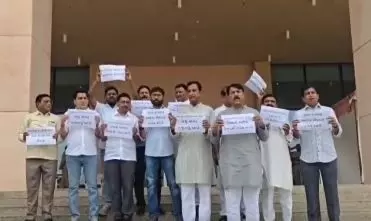
A handful of Congress MLAs exited the assembly to chant slogans and briefly gather on the building’s steps before heading back into the session
First day of Gujarat monsoon session marked by Congress walkout, protest by AAP
While Congress demanded minister Bachubhai Khabad's resignation because of his alleged involvement in a corruption scam; govt set to table 5 key amendment bills

Members of the Opposition Congress staged a walkout from the Gujarat legislative assembly in Gandhinagar on Monday (September 8), on the first day of the session, and protested outside the premises, demanding the resignation and arrest of Bachubhai Khabad, the minister of state for panchayat and agriculture.
This demand stems from Khabad's alleged involvement in a large-scale corruption case in the Mahatma Gandhi National Rural Employment Guarantee Act (MGNREGA) scheme.
The disruption occurred on the opening day of the three-day session, just ahead of Question Hour.
According to sources, Bachubhai, who represents the Devgadhbariya constituency in Dahod district of Gujarat, will be absent from the monsoon session in the legislative assembly. In his stead, Raghavji Patel, who is in-charge of the agriculture and rural development, will take questions related to Khobad's portfolio.
Also read: Why the same activists, political leaders are detained every time PM Modi visits Gujarat
In May, Bachubhai’s son Balvant Khabad was arrested for the alleged involvement in the scam worth Rs 71 crore.
Rain disrupts Congress plan
The Congress had initially planned a bigger protest against Khabad near the Assembly, which would have included the members and workers of the party but heavy rain disrupted the plan.
Ultimately, the protest turned out to be a scaled-down event with only a handful of MLAs exiting the assembly to chant slogans and briefly gather on the building’s steps before heading back into the session.
Following the Congress walkout, three AAP legislators also launched a similar protest. Their grievance, however, was against the poor roads in the state.
Three AAP MLAs protest at the Gujarat Assembly building on the issue of bad roads on September 8, 2025, the first day of the monsoon session.
Also read: Made-in-India e-Vitara: PM Modi flags off Maruti's first electric vehicle
Meanwhile, Chaiter Vasava, an AAP MLA from Dediapada, was released on a three-day interim bail by the Narmada sessions court to attend the monsoon session.
He was arrested more than two months ago following an altercation with BJP leader Sanjay Vasava. Chaiter was released from Vadodara Central Jail around 9 am, and he headed for Gandhinagar to attend the session.
Remembering Vijay Rupani
Earlier on Monday, the session kicked off with a motion to express condolences for the tragic death of former chief minister Vijay Rupani in the Air India plane crash in Ahmedabad on June 12.
Key legislative work will be taken up on Tuesday (September 9) and Wednesday (September 10). During the session, Chief Minister Bhupendra Patel will initiate a motion to celebrate the success of the Indian Army’s Operation Sindoor against Pakistan in May.
Five crucial amendment bills are also expected to be tabled.
Also read: Gujarat: How BJP govt has tweaked leasehold land norms to benefit cronies, saffron outfits
Five amendment bills
The Bharatiya Janata Party (BJP) government is set to table an amendment to the Factories Act 1948. On July 1, the Factories (Gujarat Amendment) Ordinance, 2025, was issued by the state’s labour, skill development and employment department, and it came into effect when the Assembly was not in session.
The government will now seek to turn the ordinance into an Act.
During the session, Chief Minister Bhupendra Patel will initiate a motion to celebrate the success of the Indian Army’s Operation Sindoor against Pakistan in May. Five key amendment bills are also expected to be tabled.
As per the amendment, the factories can extend work shifts to twelve hours per day, including intervals, with workers’ written consent. Night shifts would be allowed for women workers under a set of safety protocols such as adequate lighting, CCTV surveillance, female security personnel and secure transportation.
This is the second time Gujarat has attempted to amend the original Act. In 2020, the government proposed an amendment increasing working hours post the COVID-19 pandemic and easing the process of sacking workers. It was challenged by workers’ bodies and turned down by the Supreme Court.
Also read: Gujarat BJP: Internal rifts out in open, rebels slam 'Congress culture'
There is also the Gujarat Goods and Services Tax (Second Amendment) Bill 2025 that will align state tax laws with GST Council recommendations and ensure uniformity with the Central GST Act.
The Jan Vishwas Bill seeks to decriminalise provisions under 11 state laws. As per the amendment, punishment by imprisonment will be replaced with monetary penalties for minor compliance violations for the Gujarat Industrial Development Act, Labour Welfare Fund Act, Municipalities Act, APMC Act, Domestic Water Supply Act, Cooperative Societies Act, Town Planning Act, Shops and Establishments Act and the Electricity Duty Act.
The amendment bill to the Gujarat Medical Practitioners Act, 1963, will officially replace the term ‘Board’ with ‘Council’ for the state medical bodies for Ayurvedic and Unani systems of medicine, aligning it with central government directives.
Also read: Gujarat Congress leader stokes controversy by calling Gandhiji 'cunning'; BJP slams party
The amendment bill to the Gujarat Medical Institutions (Registration and Regulation) Act 2021 will extend the timeline for clinical establishments to complete mandatory registrations and ensure smooth implementation of the 2021 Act.
Interestingly, the Factories (Gujarat Amendment) Ordinance was met with massive protests from various trade union bodies and workers across Gujarat.
Tight security
Fearing that the tabling of the bills to change the ordinance into an Act will invite further protests, tight security has been put in place around the Assembly complex.
During the three-day session, two superintendents, six deputy superintendents, 30 police inspectors, 60 police sub-inspectors, the bomb-disposal squad and more than 500 state police and state reserve police personnel will remain deployed in the state capital.

